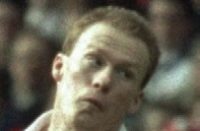 There is a myth that the full All Blacks have never played in Fiji which is not quite true. In 1913, on the way back from their triumphant tour of the USA they called into Suva to play a side raised by the newly formed Fijian Rugby Union, dispensing a 67-3 drubbing against the whites-only team of ex-pats who then made up the Union. Mr P J Sheehan, a businessman from Suva, scored the only try for Fiji who still await a second visit from New Zealand's Test side.
There is a myth that the full All Blacks have never played in Fiji which is not quite true. In 1913, on the way back from their triumphant tour of the USA they called into Suva to play a side raised by the newly formed Fijian Rugby Union, dispensing a 67-3 drubbing against the whites-only team of ex-pats who then made up the Union. Mr P J Sheehan, a businessman from Suva, scored the only try for Fiji who still await a second visit from New Zealand's Test side.
Fiji play the Barbarians at Twickenham this week to celebrate that centenary and in that 100 years Fiji have come a long away, in fact given their limited resources they have moved mountains, yet the feeling persists that given a tad more encouragement and financial assistance they might have achieved much more and the game would be better for it.
In truth the emergence of Fiji presented rugby union with a dilemma. Their natural genius for running and passing at high speed seems to represent rugby in its purest form but is at odds with the laws of a sport that has developed over nearly 150 years to accommodate all body shapes and sizes and all playing conditions, not least clawing mud and cold winter days.
Nobody in the corridors of power has ever been minded to change those laws just to suit a small island nation with next to no voice in the sport's governance and absolutely no commercial clout -– which possibly explains why Fiji has made a virtue of Sevens and is beginning to branch out into rugby league with startling success.
Mind you, they have still rattled a few bones, pricked a few egos over the last century. Between the Wars, with the native Fijians now dominating the team, they enjoyed success in regular games against Tonga and NZ Maori and in 1939 became the only touring team ever to return from New Zealand unbeaten, winning seven of their eight games – including an unofficial ‘Test' against the Maori – and drawing their other match.
Immediately after World War II was a golden era. In 1951 they beat NZ Maori again in New Zealand and drew a Test series 1-1 in Australia. They again drew 1-1 with Australia in 1954 and in 1957 they travelled on to New Zealand to hammer the Maori two weeks in succession and beat Auckland 38-17.

Sixty years ago now a small rugby nation was already making huge waves but still rugby looked on them more as a quaint curiosity and occasional stop-off on the way back from major tours. Admittance to the “cosy club” that ran the game was always barred.
In 1964 Fiji embarked on a big “coming out” tour of Wales and France and scored six tries against a Test strength Wales side at the Arms Park before losing 28-22 and in 1970, at
Gosforth, they produced their signature performance thrashing a Barbarians team to die for 29-9 at Gosforth, scoring seven tries in the process. The Fijians were on the cusp and looked set to take the rugby world by storm but it never quite happened although a 25-21 over a weary Lions team in 1977 was another reminder of their latent quality.
Travelling and finance remained huge obstacles, cold weather diminished them, the Australians and Kiwis pinched some of their best players which was irritating and their hot-headedness wounded themselves more than the opposition. And nothing much changes. For a period just before half-time against Italy last week they were down to 11 players, having had four binned. And still they only lost 37-31.
Twice they have reached the World Cup quarter-finals, losing 31-16 in Sydney to France in 1987 and then producing their best ever competitive performance against eventual champions South Africa in 2007, going down 37-20 in much closer game than the score suggests. Close but no cigar.
Shamefully rugby in Fiji remains a bit of a mystery to most of us, we have not made it our business to learn. Participation levels are still the highest in the world. Out of a population of 837,271 over 36,030 players are registered with possibly another 20,000 playing regularly but not registered. Bear in mind also that, of that 837,271, just over half would be Indo-Fijians whose interest in the game is strictly limited.
Our stereotypical image of carefree pick-up games on the beaches and in the fields is not entirely false but dating back to the formation of the Fijian Union 100 years ago there is also a high degree of organisation with 36 sub unions holding sway across the archipelago and 500 clubs who field a senior side of some sort.
Sevens was their glory – world champions in 1997 and 2005 – but New Zealand have consistently overshadowed them in recent years in the IRB World Series although the great crusade to win the Olympic title in Rio might galvanise them. England's Ben Ryan has been put in charge in the hope of adding science and organisation to abundant skill.
But schools are at the very heart of the Fijian rugby system and there were massive celebrations at the end of September when Fiji Schools claimed their first ever win over New Zealand in an U18 Schools international in the annual triangular tournament in Sydney. Centre Vilame Kikau scored a late try to make it 20-20 and his partner in midfield Manoa Nakolivevu stepped up to kick the winning conversion.

You hope for the best but somehow fear the worst. It will be an interesting sociological and sporting experiment to see in, say, ten years time, how many of that outstanding Fiji Schools XV chase glory with the Flying Fijians in international rugby and how many “become” All Blacks. Alas a tenner says at least two will make their names playing for New Zealand not Fiji.
It is the biggest problem facing Fijian rugby and the only way forward seems rock solid funding to establish a full time academy for players in their late teens so they can remain on the island for the initial part of their senior careers and be capped before they set off into the big wide rugby world to earn fame and fortune.
Certainly that is what former national coach George Simpkin has proposed many times with Simpkin also making the sound point that so many young players leave the islands so early that there is no opportunity for great playing combinations to be formed on the pitch and enduring friendships off the field.
Fijian rugby, it leaves you scratching your head. Under-performing over-achievers if such a thing is possible. Exciting, flawed, infinitely complex and often confused.
Alas nothing sums it up better for me than the sight this June of Rupeni Caucau, the greatest natural rugby talent I have ever witnessed, flying back to Fiji to play FOR the All Blacks Legends XV AGAINST Fiji as part of their centenary celebrations.
This is a man who never played for New Zealand and, alas, only climbed into a Fiji Test shirt on nine occasions. What went wrong, what a tragic waste. But what a player!


























